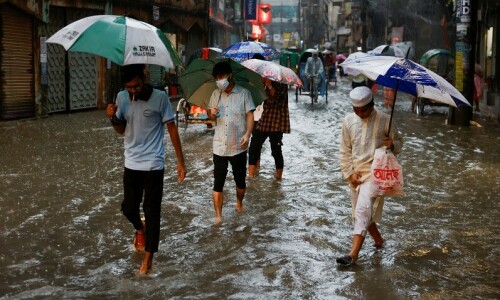SITTWE: Thousands fled Myanmar’s west coast and officials in neighbouring Bangladesh raced to evacuate Rohingya refugees on Saturday as the most powerful cyclone in the region for over a decade churned across the Bay of Bengal.
Cyclone Mocha was packing winds of up to 220km an hour, according to India’s meteorological office, equivalent to a category four hurricane.
It is expected to weaken before making landfall on Sunday morning between Cox’s Bazaar, where nearly one million Rohingya refugees live in camps largely made up of flimsy shelters, and Sittwe on Myanmar’s western Rakhine coast.
On Saturday, Sittwe residents piled possessions and pets into cars, trucks and tuk-tuks and headed for higher ground. “We have our grandma in our family and we have to take care of her,” Khine Min told AFP from a truck packed with his relatives on a road out of the state capital.
Rohingya refugees among vulnerable population, as cyclone is packing winds of up to 220km an hour
“There is only one man left in Sittwe to take care of our homes.” Shops and markets in the town of about 150,000 people were shuttered, with many locals sheltering in monasteries.
Kyaw Tin, 40, said he could not leave the area as his son was in a local hospital. “I’m worried that this cyclone will affect our state just like Nargis did,” he added, referring to a 2008 storm that killed over 130,000 people in southern Myanmar.
While Myanmar’s junta authorities were supervising evacuations from villages along the Rakhine coast, Myanmar Airways International said all its flights to Rakhine state had been suspended until Monday.
In neighbouring Bangladesh officials moved to evacuate Rohingya refugees from ‘risky areas’ to community centres.
“Cyclone Mocha is the most powerful storm since Cyclone Sidr,” Azizur Rahman, the head of Bangladesh’s Met Office, told AFP. That cyclone hit Bangladesh’s southern coast in November 2007, killing more than 3,000 people.
Bangladeshi authorities have banned the Rohingya from constructing permanent concrete homes, fearing it may incentivise them to settle permanently.
“We live in houses made of tarpaulin and bamboo,” said refugee Enam Ahmed, who resides at the Nayapara camp near the border town of Teknaf. “We are scared. We don’t know where we will be sheltered. We are in a panic.”
Forecasters expect the cyclone to bring a deluge of rain, which can trigger landslides.
Mocha is also predicted to unleash a storm surge up to 13 feet high, which could inundate low-lying villages.
Published in Dawn, May 14th, 2023
















































Dear visitor, the comments section is undergoing an overhaul and will return soon.